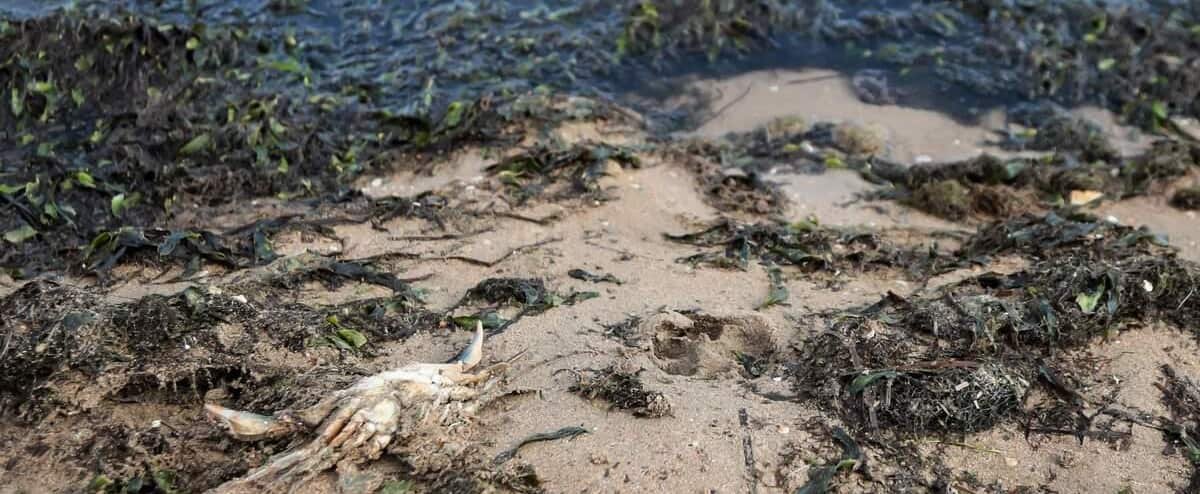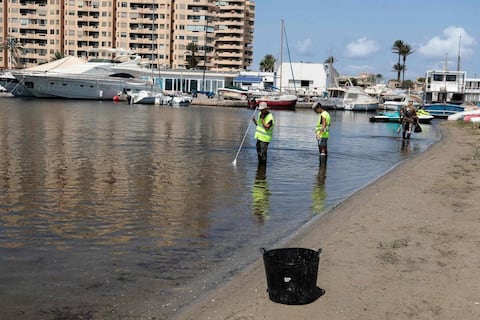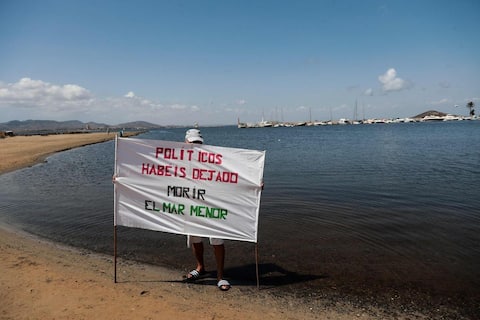More than five tons of dead fish have been collected over the past 10 days from the surface of the Lesser Sea, a salt lake in southeastern Spain. The old tourist paradise is dying, deprived of oxygen due to agricultural nitrate pollution.
Images of dying fish, their mouths practically out of the water trying to suck in some air as dead mates piled by the thousands in baskets on the sand, grabbed Spanish headlines.
On Monday, the seventh day of the massacre, regional authorities estimated the amount recovered at 4.5 to 5 tons, but dead fish have continued to appear since then.
“The worst wildlife mortality in known history did not end in Minor Sea,” the World Wide Fund for Nature (WWF) said in a tweet on Wednesday.
With an area of 135 square kilometers, the Lesser Sea is one of the largest salt lakes in the Mediterranean, separated from it by a sandbank of 22 kilometers.
Its maximum depth is seven metres.
“The situation is tragic,” sums up to AFP, president of the Association of Naturalists of the Southeast (ANSE), Pedro Garcia, speaking of the “rush” of tourists out of the area, while estimating the number of dead fish. It can be up to twice what the authorities provided.
“I haven’t been able to swim for three years, there’s a bad smell,” a woman on the beach complained to public television TVE.
algae bloom
According to scientists, the main reason for the sudden lack of oxygen is the arrival in the lake of hundreds of tons of nitrates, which are used as fertilizer in intensive agriculture.
The fertilizer stimulates the growth of algae (phytoplankton), which forms a green or brown layer on the surface that blocks light from reaching the bottom, kills seafloor vegetation, and reduces the amount of oxygen as it dies and then decomposes.
Thus, these green algae create oxygen-free zones that suffocate the aquatic ecosystem, a phenomenon called “eutrophication”, which has arisen due to global warming, according to the scientists.
The Minister for Environmental Transformation, Socialist Teresa Ribera, who visited the site on Wednesday, accused the territorial government, in the hands of the (right-wing) Popular Party, of condoning illegal agricultural practices.
“It is no longer possible to hide. We have to confront it,” she said in a press conference, noting that the area has “8000 hectares without irrigation license, where water is being pumped illegally and which uses much more water than is allowed.”
“Escape” from vacationers
Farmers say they feel unjustly accused.
“They are harming a sector that strictly respects all legislation,” Vicente Carrion, head of the local branch of the agricultural union COAG, told AFP.
But the official college of biologists in the region of Murcia is categorical: the nitrate spill explains, without a doubt, the current eutrophication crisis, with consequences for high animal mortality, foul odor and cloudy color. Water “.
In 2019, the young sea has already experienced a similar episode, but the dead fish were less (about three tons).
For Pedro García, water pollution with nitrates is the main, but not the only problem: “the excessive number of seaports, the destruction of the coast with the construction of residential complexes, the arrival of large amounts of sediment. Minerals” also play a role.
“It’s a very changing landscape” and the economic cost of the crisis “is brutal, and the flight of vacationers has been massive,” he adds.
The mid-August heat wave didn’t help the fish, according to the Spanish Institute of Oceanography: Eutrophication “reduces their ability to resist changes caused by heat stress from a heat wave or other factor.”

“Extreme twitteraholic. Passionate travel nerd. Hardcore zombie trailblazer. Web fanatic. Evil bacon geek.”




